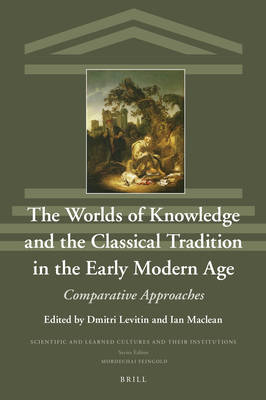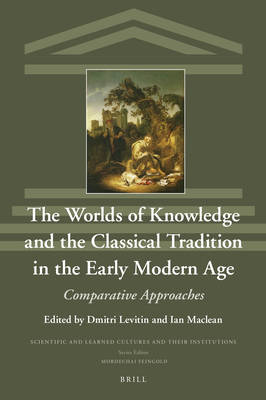
- Afhalen na 1 uur in een winkel met voorraad
- Gratis thuislevering in België vanaf € 30
- Ruim aanbod met 7 miljoen producten
- Afhalen na 1 uur in een winkel met voorraad
- Gratis thuislevering in België vanaf € 30
- Ruim aanbod met 7 miljoen producten
Zoeken
The Worlds of Knowledge and the Classical Tradition in the Early Modern Age
Comparative Approaches
€ 232,45
+ 464 punten
Omschrijving
Recent research has established the continued importance of engagement with the classical tradition to the formation of scholarly, philosophical, theological, and scientific knowledge well into the eighteenth century. The Worlds of Knowledge and the Classical Tradition in the Early Modern Age is the first attempt to adopt a comparative approach to this phenomenon. An international team of scholars explores the differences and similarities - across time and place - in how the study and use of ancient texts and ideas shaped a wide range of fields: nascent classics, sexuality, chronology, metrology, the study of the soul, medicine, the history of Judaeo-Christian interaction, and biblical criticism. By adopting a comparative approach, this volume brings out some of the most important factors in explaining the contours of early modern intellectual life.
Contributors: Karen Hollewand, Dmitri Levitin, Jan Machielsen, Ian Maclean, C. Philipp E. Nothaft, Cesare Pastorino, Michelle Pfeffer, Jetze Touber, Timothy Twining, and Floris Verhaart.
Contributors: Karen Hollewand, Dmitri Levitin, Jan Machielsen, Ian Maclean, C. Philipp E. Nothaft, Cesare Pastorino, Michelle Pfeffer, Jetze Touber, Timothy Twining, and Floris Verhaart.
Specificaties
Betrokkenen
- Uitgeverij:
Inhoud
- Aantal bladzijden:
- 456
- Taal:
- Engels
- Reeks:
- Reeksnummer:
- nr. 33
Eigenschappen
- Productcode (EAN):
- 9789004462328
- Verschijningsdatum:
- 29/07/2021
- Uitvoering:
- Hardcover
- Formaat:
- Genaaid
- Afmetingen:
- 155 mm x 234 mm
- Gewicht:
- 807 g

Alleen bij Standaard Boekhandel
+ 464 punten op je klantenkaart van Standaard Boekhandel
Beoordelingen
We publiceren alleen reviews die voldoen aan de voorwaarden voor reviews. Bekijk onze voorwaarden voor reviews.







